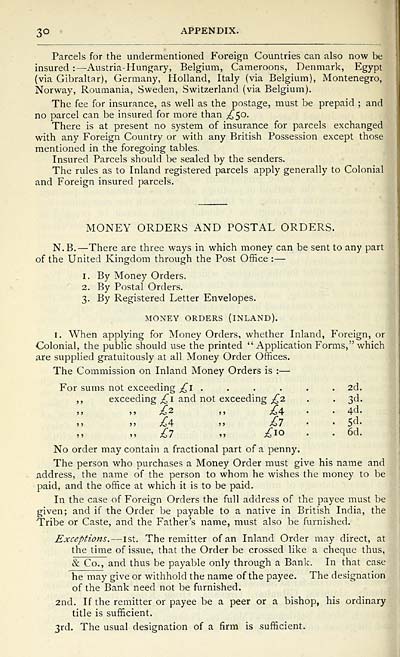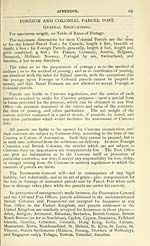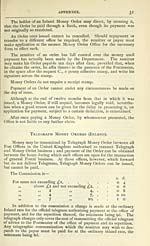Download files
Complete book:
Individual page:
Thumbnail gallery: Grid view | List view

30 APPENDIX.
Parcels for the undermentioned Foreign Countries can also now be
insured : — Austria- Hungary, Belgium, Cameroons, Denmark, Egypt
(via Gibraltar), Germany, Holland, Italy (via Belgium), Montenegro,
Norway, Roumania, Sweden, Switzerland (via Belgium).
The fee for insurance, as well as the postage, must be prepaid ; and
no parcel can be insured for more than £$o.
There is at present no system of insurance for parcels exchanged
with any Foreign Country or with any British Possession except those
mentioned in the foregoing tables.
Insured Parcels should be sealed by the senders.
The rules as to Inland registered parcels apply generally to Colonial
and Foreign insured parcels.
MONEY ORDERS AND POSTAL ORDERS.
N.B. — There are three ways in which money can be sent to any part
of the United Kingdom through the Post Office :—
1. By Money Orders.
2. By Postal Orders.
3. By Registered Letter Envelopes.
MONEY ORDERS (INLAND).
I. When applying for Money Orders, whether Inland, Foreign, or
Colonial, the public should use the printed " Application Forms," which
are supplied gratuitously at all Money Order Offices.
The Commission on Inland Money Orders is : —
For sums not exceeding £1 . . . . . . 2d.
,, exceeding £1 and not exceeding £2. . . 3d.
£2 ,, £4 4d.
„ £A „ £7 ■ • 5d.
£7 „ £*o . . 6d.
No order may contain a fractional part of a penny.
The person who purchases a Money Order must give his name and
address, the name of the person to whom he wishes the money to be
paid, and the office at which it is to be paid.
In the case of Foreign Orders the full address of the payee must be
given; and if the Order be payable to a native in British India, the
Tribe or Caste, and the Father's name, must also be furnished.
Exceptions. — 1st. The remitter of an Inland Order may direct, at
the time of issue, that the Order be crossed like a cheque thus,
& Co., and thus be payable only through a Bank. In that case
he may give or withhold the name of the payee. The designation
of the Bank need not be furnished.
2nd. If the remitter or payee be a peer or a bishop, his ordinary
title is sufficient.
3rd. The usual designation of a firm is sufficient.
Parcels for the undermentioned Foreign Countries can also now be
insured : — Austria- Hungary, Belgium, Cameroons, Denmark, Egypt
(via Gibraltar), Germany, Holland, Italy (via Belgium), Montenegro,
Norway, Roumania, Sweden, Switzerland (via Belgium).
The fee for insurance, as well as the postage, must be prepaid ; and
no parcel can be insured for more than £$o.
There is at present no system of insurance for parcels exchanged
with any Foreign Country or with any British Possession except those
mentioned in the foregoing tables.
Insured Parcels should be sealed by the senders.
The rules as to Inland registered parcels apply generally to Colonial
and Foreign insured parcels.
MONEY ORDERS AND POSTAL ORDERS.
N.B. — There are three ways in which money can be sent to any part
of the United Kingdom through the Post Office :—
1. By Money Orders.
2. By Postal Orders.
3. By Registered Letter Envelopes.
MONEY ORDERS (INLAND).
I. When applying for Money Orders, whether Inland, Foreign, or
Colonial, the public should use the printed " Application Forms," which
are supplied gratuitously at all Money Order Offices.
The Commission on Inland Money Orders is : —
For sums not exceeding £1 . . . . . . 2d.
,, exceeding £1 and not exceeding £2. . . 3d.
£2 ,, £4 4d.
„ £A „ £7 ■ • 5d.
£7 „ £*o . . 6d.
No order may contain a fractional part of a penny.
The person who purchases a Money Order must give his name and
address, the name of the person to whom he wishes the money to be
paid, and the office at which it is to be paid.
In the case of Foreign Orders the full address of the payee must be
given; and if the Order be payable to a native in British India, the
Tribe or Caste, and the Father's name, must also be furnished.
Exceptions. — 1st. The remitter of an Inland Order may direct, at
the time of issue, that the Order be crossed like a cheque thus,
& Co., and thus be payable only through a Bank. In that case
he may give or withhold the name of the payee. The designation
of the Bank need not be furnished.
2nd. If the remitter or payee be a peer or a bishop, his ordinary
title is sufficient.
3rd. The usual designation of a firm is sufficient.
Set display mode to: Large image | Transcription
Images and transcriptions on this page, including medium image downloads, may be used under the Creative Commons Attribution 4.0 International Licence unless otherwise stated. ![]()
| Scottish Post Office Directories > Towns > Greenock > Post-office Greenock directory > 1894-1895 > (432) |
|---|
| Permanent URL | https://digital.nls.uk/87497137 |
|---|
| Description | Annual. |
|---|---|
| Shelfmark | Various |
| Description | Directories of individual Scottish towns and their suburbs. |
|---|
| Description | Around 700 Scottish directories published annually by the Post Office or private publishers between 1773 and 1911. Most of Scotland covered, with a focus on Edinburgh, Glasgow, Dundee and Aberdeen. Most volumes include a general directory (A-Z by surname), street directory (A-Z by street) and trade directory (A-Z by trade). |
|---|


